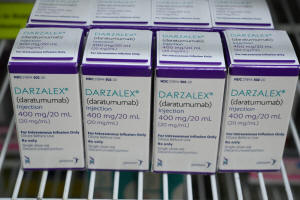Drugmakers go under the skin, skirting early US Medicare price
negotiations
 Send a link to a friend
Send a link to a friend
 [July 28, 2023]
By Michael Erman [July 28, 2023]
By Michael Erman
NEW YORK (Reuters) - Injectable versions of some widely-used cancer
drugs including Johnson & Johnson's blockbuster multiple myeloma
treatment Darzalex are likely to be excluded from new U.S. government
price negotiations for years, drugmakers told Reuters, protecting
billions in revenue.
Whether the government agrees that adding an ingredient enabling infused
drugs to be given by injection will allow them to be considered new
medicines and significantly delay eligibility for price negotiations is
being closely watched by Wall Street and the drugmakers.
J&J, Merck & Co, which is testing an injectable version of its
top-selling immunotherapy Keytruda, and Halozyme Therapeutics, which
licenses the critical new ingredient, hyaluronidase, for subcutaneous
drugs, all told Reuters they believe the reformulation qualifies the
medicines to be treated like new drugs.
Bristol Myers Squibb and Roche, which are developing versions for under
the skin injection of cancer immunotherapies Opdivo and Tecentriq,
respectively, said it was too soon to say.
President Biden’s signature Inflation Reduction Act (IRA) allows the
government Medicare health program for the first time to negotiate
prices for some of its most costly drugs, starting at a minimum discount
of 25% to a drug's price. It aims to create $25 billion in annual
savings by 2031 for a country that pays more for prescription medicines
than any other.

Medicare, which serves Americans age 65 and older, is working on
selecting 10 drugs for the first wave of negotiation on prices that
would go into effect in 2026. They will be selected from medicines that
have been on the market at least nine years - 13 years for more complex
biotech drugs - without what the agency sees as ample direct
competition.
Each year, Medicare will add more drugs to the list, the names of which
have not yet been disclosed. In 2028, it will start negotiating on drugs
that are typically given in a hospital setting like these.
The U.S. Centers for Medicare & Medicaid Services, which runs the
Medicare program for more than 60 million Americans, declined to comment
on whether it will consider older medicines that add hyaluronidase as
new.
Evercore ISI biotech analyst Michael DiFiore said he expects Medicare to
do so because hyaluronidase is an active ingredient that allows the body
to absorb more of the drug when it is injected.
[to top of second column]
|

Boxes of Darzalex are seen at the
Huntsman Cancer Institute at the University of Utah in Salt Lake
City, Utah, U.S., July 22, 2022. REUTERS/George Frey/File Photo
 "That is unique specialized
technology," DiFiore said.
When Medicare issued guidelines for negotiations earlier this year,
it closed many loopholes that could have allowed drugmakers to game
the system by making small changes to their drugs. Going from an
immediate release to an extended release formulation would be one
example of this, he said.
Injectable cancer treatments that include hyaluronidase are not that
in that category, DiFiore said.
BILLIONS AT STAKE
J&J Chief Financial Officer Joseph Wolk, in an interview last week,
said he does not expect the subcutaneous version of Darzalex, called
Darzalex Faspro, to be eligible for negotiation until 2033 or 2034.
That could be five or more years beyond Darzalex, which will have
been on the market for 13 years in 2028. Faspro, launched in 2020,
already accounts for more than 80% of Darzalex revenue, which is due
to rise to $9.5 billion this year.
Merck has said it hopes to launch its Keytruda injectable within a
few years, with approval starting the 13-year clock until
negotiation eligibility. The infused version of Keytruda could be
subject to the program as soon as 2028.
Merck previously told Reuters it expects this version of Keytruda
could replace the more time consuming infusion for most patients.
Keytruda revenue is expected to top $24 billion this year and could
exceed $30 billion as soon as 2026, according to analyst estimates.
San Diego-based Halozyme had $660 million in 2022 revenue. The
company has said its expects revenue from subcutaneous drugs
containing hyaluronidase to drive its growth going forward.
CEO Helen Torley said in Halozyme's opinion, Medicare has made its
view on what defines separate drugs “very, very clear,” and that
these injectables made with hyaluronidase will be treated as a new
drug.
(Reporting by Michael Erman; Additional reporting by Patrick
Wingrove; Editing by Caroline Humer and Bill Berkrot)
[© 2023 Thomson Reuters. All rights
reserved.]This material may not be published,
broadcast, rewritten or redistributed.
Thompson Reuters is solely responsible for this content. |